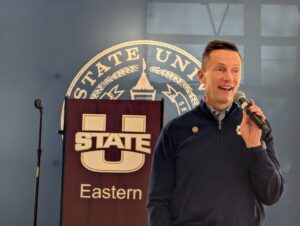Evolution 2.5 Driven

This archived article was written by: Nathaniel Woodward
So far we have discovered the origins of the cosmos as well as the origins of life on Earth; however I’d like to take a break before we begin the next series in evolution and discuss why science matters. Why do I engage so deeply with science? That’s a question worth exploring and in the end, hopefully you will understand why I do what I do.
Science provides two of the most critical aspects of existence, which is answers and questions. It provides resources that enable you to ask questions, create solutions and then test them to discover answers to those questions and perhaps even better, new questions. I can’t convey to you how exciting missing data is to me. The process of discovery holds within itself untold wonders within the darkness of the unknown which can be daunting and troublesome.
Why involve myself with something as unsettling as the unknown darkness of the unexplored cosmos, or why involve yourself with these mysteries as I have pled through these articles? Let me tell you my story. I, like so many, grew up watching Bill Nye conduct fun and relatable experiments and present them at my intellectual level.
Those tapes captivated my brother and myself, encouraging us to make a difference, explore the universe around us and apply ourselves for the betterment of humankind. As I grew, I had a less than stellar academic career through primary and secondary education, simply because I wasn’t driven; I had no passion. Afterward, I applied myself to my career, learning about and treating sleep disorders. The science thrilled me; everything about the process of research captivated me again as those Bill Nye tapes had in my childhood. In my 20s I decided to return to college and this time pursue the sciences as I had dreamt about. I found success because I was finally driven.
This is not the end of the story, to be engaged effectively you must make it your passion. For some, finding your passion comes naturally, through absolute dedication to what they study and for others it comes through discovery, finding something that envelopes their imaginations and controls their thoughts. But for some, like myself, it comes from another place, or two.
In January 2012, the world changed. My beautiful daughter Bridgette, the diploid creation of successful meiosis and fertilization, came screaming into life. What an amazing process to observe, the growth from two cells, the body’s largest and smallest joining together to form this perfect organism. This was truly beyond my understanding and I felt the first tinges of that passion appear in my life. I hungered for more of the unexplored darkness of my cosmos.
The final step in my journey, so far, came on May 13, 2014. My second child, a perfect little boy named Jonathan passed away. Jonathan was a full-term baby, who never took a breath of the air we take for granted. Jonathan had a chromosomal condition called trisomy 21 or Down Syndrome, which occurs in the second phase of cellular meiosis, where copied chromosomes line up in the center of the nuclear envelope and separate into the final-four-haploid-daughter cells. In his case, one extra 21st chromosome stayed behind, leading to the complications which caused his death. I had the deeply personal experience of meeting him only one time, and as many of you know, some experience are too precious to be tainted by words.
There are, in science, a few things we know absolutely, or what we call laws. Scientific laws hold up across the spectrum of fields, biology, chemistry, physics, etc. One is called the law of conservation of energy, where no energy in the universe was ever created. It has always been in existence and never will be destroyed, just transformed. Every particle, every atom that constituted my son has always existed and always will, every photon that bounced of his blonde hair and reached my eyes, continues its journey throughout the stars and the universe, forever. Therein lies the reason for my passion.
Science is the practice of searching. Searching for those things lost and yet to be discovered. Somewhere out in the emptiness of the cosmos are those photons, which gives me reason to study and work and slave to discover new and excited things.
Jonathan belongs to the stars now, so I’ll search for him, unafraid of the dark.




